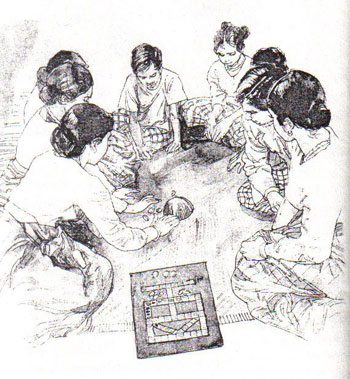It's just a week to go to celebrate the biggest national festival in
Sri Lanka – the Sinhala and Tamil New Year.
This is the time when
traditional values and long
established customs are revived and reflected upon. It's also the time for the family and the relatives to meet. After all Avurudu comes but once a year!
Even in the remotest
village, everybody gets ready to celebrate the
'avurudu.' The houses get a new coat of paint. Houses with thatched roofs are often replaced with a new set of 'pol athu.' In the good old days when the elder in the family gets on top of the roof and makes a 'hoo' call, the villagers gather and help in the activity.
The females in the household would prepare a rice and curry meal which everyone will enjoy at whatever time they finish the job. Such a gathering displays the unity of the village and a feeling of
comradeship.
 |
| A pancha game in progress. (Courtesy: 'Uprooted') |
It's also a busy time for the mother in the village home. She plans to make the whole gamut of
sweetmeats in the house itself. The list is pretty long. Konda kevum,
athiraha, mung kevum, weli thalapa, aluva, aggala, aasmi take
priority. Rice is pounded and flour is prepared at home. Here again, many a female in the neighbourhood would join in the many tasks. The final result is a whole heap of goodies for the 'avurudu mese,' as the table full of sweetmeats is referred to.
Ensuring that there is a stock of ripe bananas is the responsibility of the father. Well ahead of the
'avurudu' he would pick a half ripe bunch from a tree in the garden and bury it in a closed pit covered with leaves. Through experience he would know exactly when he should open the pit and remove the bananas.
There is more work for the mother. She has to stitch new clothes for the entire family. Cloth is bought well in advance to match the designated avurudu colour. (Pearl white is the 'lucky' colour this year).
She also has to get new pots and pans to cook the avurudu meal. In the famous novel 'Gamperaliya,' (English version is now available titled 'Uprooted') the renowned author Martin Wickramasinghe describes the visit of the potter:
"It was the custom of the village potter to bring a pingo load of clay pots and pans to each of three or four leading families in the village, a few days before the New Year. The potter was invited to partake of a meal of rice followed by
sweetmeats. He was given gifts of uncooked rice, coconuts, chillies, salt and home made sweetmeats, which enabled him to enjoy the New Year meal with his own family in style. In his pingo load of pots, the potter included stocks of little toy clay pots for the children in the households he visited."
While this was what happened in the early days, the average family would today pick up their pots and pans from the weekly 'pola.'
Hackeries made
specially for racing are not a common sight today. Yet these come into the open during 'avurudu' time. It's a popular sport during New Year festivities. These are taken out, oiled and made ready for the races.
Among the indoor games played during this season, panchi is very popular
particularly among the young ones. Wickramasinghe vividly portrays the game: "After the meal, all except the elders divided
themselves into two teams to play panchi.
Each of the players of two groups
alternately took turns to toss seven lead-filled little cowries held in the hollow of half of a small polished coconut shell, onto the
polished convex surface of
a larger inverted half of a coconut shell. After each toss of the cowries, those that had come to rest with the flat surface upturned scored a point. The points scored by each side were registered by moving one or more of a set of pawns along a pattern of squares outlined on a wooden board, towards a home-base. The first team to take all the pawns to the home base won.
Moving the pawns in the most advantageous way, and avoiding elimination by pawns of the opponents, requires foresight,
experience and
shrewdness... As the game progressed, arguments and taunts exchanged between the opposing teams became heated.
As the New Year
approaches, there is
hardly a household where the rattle of the cowries and the clatter they make when tossed onto the inverted coconut shell, is not heard." |

